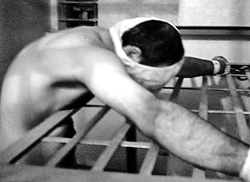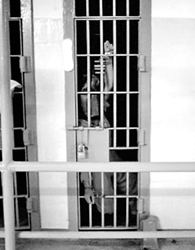
Looking at the bigger picture'Ghosts of Abu Ghraib' looks at perpetrators, victims and leaders who acccepted atrocities NEW YORK (AP) - It's a signal moment in "Ghosts of Abu Ghraib" when Sabrina Harman explains how she came to be photographed, grinning wide, beside the body of an Iraqi detainee who had been tortured to death. "I didn't know he was just murdered," recalls Harman, who in 2003 was a guard at the notorious prison. "It was supposed to be just a dead guy. We didn't realize until after these photos that he was bleeding in places that you wouldn't bleed from getting a heart attack."
Just another photo op at Abu Ghraib. And, thanks to the many photos snapped there, the hideous behavior they display was exposed in spring 2004 by The New Yorker magazine and "60 Minutes II," shocking the world. But for all their stomach-churning explicitness - showing prisoners stripped naked, put in humiliating poses and subjected to other cruel treatment - these photos can't chart how such a thing could have happened. Now "Ghosts of Abu Ghraib," which premiered Thursday on HBO, gives the big picture. "The film is not just about Abu Ghraib and what happened there, it's also about America, and who we are as a country," said Rory Kennedy, whose documentary builds a strong case for Abu Ghraib as the inevitable product of America's post-9/11 foreign policy. Here is President George W. Bush in fall 2001, declaring war on al-Qaida and Taliban terrorists in Afghanistan: "We will do whatever it takes to smoke 'em out and get 'em running." Here is Secretary of Defense Donald Rumsfeld stating that anyone captured "will be handled not as prisoners of war, because they're not, but as unlawful combatants" with no rights under the 1948 Geneva Conventions that guarantee humane treatment of prisoners.
Here is Maj. Gen. Geoffrey Miller, commander of the U.S. detention center at Guantanamo Bay, Cuba, who in December 2002 had gotten Rumsfeld's approval for extreme interrogation tactics at "Gitmo." In August 2003 he was dispatched to Iraq to (in Rumsfeld's reported words) "Gitmo-ize the situation" at Abu Ghraib. Here is John Yoo, a Justice Department official during 2001-03, telling Kennedy the military believed it was "following (Geneva Conventions) standards, and trying to create interrogation methods based on them." "Ghosts of Abu Ghraib" takes viewers through this unsettling back story. (Be advised: It doesn't spare the graphic images.) But at the heart of the film are the voices of Abu Ghraib's soldiers and prisoners. Kennedy lets viewers hear from several former prison personnel, including court-martialed abusers, and, even more remarkably, a half-dozen former detainees. An Iraqi man identified as Mohammad Talal says he was imprisoned with his father, who suffered injuries and failing health, then died in his arms, as a result of mistreatment by interrogators. Another man, Mudhaffar Subhi, describes guards who meted out torture "as if they were having a party." He cites in particular former Cpl. Charles Graner Jr., who "would hang people by their hands, in positions that aren't bearable for even five minutes." He adds that, throughout the crying and screaming, Graner "would walk by and say, 'Now, that's the music I like to hear."' During that period, Graner was commended by superiors for a job well done. "There's your verification," says former Spc. Megan Ambuhl, who served alongside Graner - "that, as odd and uncomfortable as the situation may be, it's what you're supposed to be doing." A request e-mailed to an Army press officer in Iraq for comment on Talal and Subhi's claims was referred to the Pentagon, which did not immediately respond Tuesday. In the fall of 2003, Graner happened to share a digital photo disc with fellow MP Joseph Darby, who wanted to copy some of Graner's travel photos. Unacquainted with the prisoner abuse, Darby was horrified by what he found on the disc along with travel scenery. He turned this evidence over to authorities. As the first to report the abuses, Darby says he was assured his identity would be kept secret. But in May 2004 he heard Rumsfeld thanking him by name during televised remarks before the Senate Armed Services Committee. By then stationed at Balad Air Base in northern Iraq, Darby learned his cover had been blown "from the TV in the chow hall," he recalls. "I was scared to death." An investigation resulted in the conviction of 11 U.S. soldiers. Besides Graner, they include former Spc. Harman, who now tries to explain why she joined in the depravity around her: "You'll go crazy if you don't adapt to what you're seeing." Former Sgt. Javal Davis, who says Abu Ghraib "turned me into a monster," likewise followed the pack as his own personal coping technique. He sums up the attitude he learned to share about the prisoners: "We're at war. War's not pretty. War's not nice. These guys kill people. Oh, well." In such an atmosphere, "after a while you become numb," Davis says. "You just zone it out." Thus does "Ghosts of Abu Ghraib" defy a widely held picture: that of soldiers as closet sadists who arrived at the prison courting trouble. "I was totally naive in having that assumption at first," Kennedy said in an interview last week. "But in retrospect, I don't think it was just an assumption that we had, but a message we were being fed by the administration and the military, and by most of the mainstream media, which didn't ask the right follow-up questions." That's what Kennedy set out to do. The youngest daughter of Robert F. and Ethel Kennedy, she's an acclaimed filmmaker whose documentaries have dealt with such topics as the global AIDS crisis, poverty and political corruption. Now in "Ghosts of Abu Ghraib," she said, "I'm not taking the MPs off the hook. I think they are responsible for what they did." But that doesn't get the United States off the hook, either. What can its leaders do to prevent another Abu Ghraib? "The answer," said Kennedy, "isn't as simple as punishing the low-ranked people and saying, 'We've solved this problem, let's move on."' Not when those photos are still haunting the nation. |
| || Front
Page | News
| Editorial
| Columns
| Sports
| Plus
| Financial
Times | International
| Mirror
| TV
Times | Funday
Times || |
| |
Copyright
2007 Wijeya
Newspapers Ltd.Colombo. Sri Lanka. |

